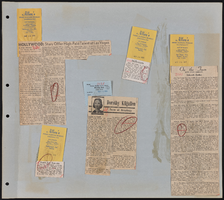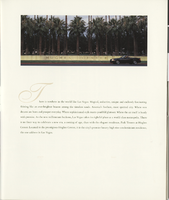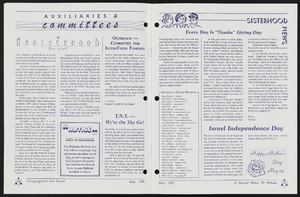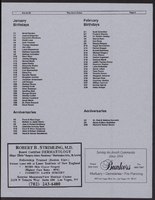Search the Special Collections and Archives Portal
Search Results
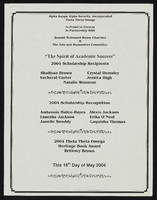
Alpha Kappa Alpha Sorority, Theta Theta Omega Chapter scholarship program documents
Date
2004-05-16
Archival Collection
Description
From the Alpha Kappa Alpha Sorority, Incorporated, Theta Theta Omega Chapter Records (MS-01014) -- Chapter records file.
Text
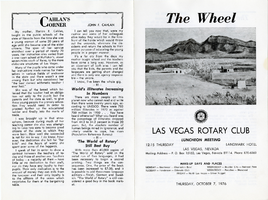
The Wheel Las Vegas Rotary Club newsletter, October 7, 1976
Date
1976-10-07
Archival Collection
Description
Newsletter issued by the Las Vegas Rotary Club
Text
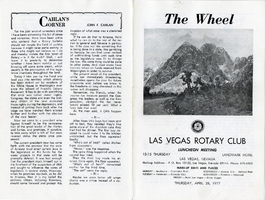
The Wheel Las Vegas Rotary Club newsletter, April 28, 1977
Date
1977-04-28
Archival Collection
Description
Newsletter issued by the Las Vegas Rotary Club
Text
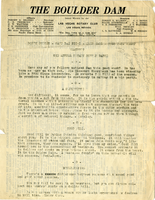
The Boulder Dam Las Vegas Rotary Club newsletter, March 10, 1927
Date
1927-03-10
Archival Collection
Description
Weekly newsletter issued by the Las Vegas Rotary Club
Text

Hitchin Post Saloon & Steakhouse Neon Survey document, August 27, 2017
Date
2017-08-27
Archival Collection
Description
Information about the Hitchin Post Saloon & Steakhouse sign that sits at 3650 N Las Vegas Blvd.
Site address: 3650 N Las Vegas Blvd
Sign owner: BWNV LLC
Sign details: Building was originally constructed in 1953 and sits on 12.70. The property houses on only a saloon/restaurant, but also a Manufactured Home Park and trailer sales.
Sign condition: 4, well maintained
Sign form: Pole mounted sign
Sign-specific description: A double sided cabinet with the words Hitchin' Post at the top in a small rectangular cabinet with green neon, and the word "Motel" in a cabinet underneath in large red neon letters. The word "vacancy" is in a smaller cabinet at the bottom in tiny green neon letters.
Sign - type of display: Neon
Sign - media: Steel
Sign environment: Property is in North Las Vegas, on North Las Vegas Blvd near Alexander Villas Park.
Sign - thematic influences: The Hitchin' Post sign shares a similar theme from when it probably was constructed. The western style themes were very popular in the Greater Las Vegas area starting in the 1940s and through the 1960s.
Sign - artistic significance: Western style themes and fonts where popular when the property opened in the early 1950s.
Survey - research locations: Hitchin' Post website, Assessor's office
Surveyor: Wyatt Currie-Diamond
Survey - date completed: 2017-08-27
Sign keywords: Neon; Steel; Pole sign
Site address: 3650 N Las Vegas Blvd
Sign owner: BWNV LLC
Sign details: Building was originally constructed in 1953 and sits on 12.70. The property houses on only a saloon/restaurant, but also a Manufactured Home Park and trailer sales.
Sign condition: 4, well maintained
Sign form: Pole mounted sign
Sign-specific description: A double sided cabinet with the words Hitchin' Post at the top in a small rectangular cabinet with green neon, and the word "Motel" in a cabinet underneath in large red neon letters. The word "vacancy" is in a smaller cabinet at the bottom in tiny green neon letters.
Sign - type of display: Neon
Sign - media: Steel
Sign environment: Property is in North Las Vegas, on North Las Vegas Blvd near Alexander Villas Park.
Sign - thematic influences: The Hitchin' Post sign shares a similar theme from when it probably was constructed. The western style themes were very popular in the Greater Las Vegas area starting in the 1940s and through the 1960s.
Sign - artistic significance: Western style themes and fonts where popular when the property opened in the early 1950s.
Survey - research locations: Hitchin' Post website, Assessor's office
Surveyor: Wyatt Currie-Diamond
Survey - date completed: 2017-08-27
Sign keywords: Neon; Steel; Pole sign
Text
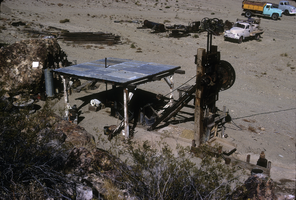
Slide of the old stamp mill, circa 1950s
Date
1950 to 1959
Archival Collection
Description
The old stamp mill, location unknown. A stamp mill (or stamp battery or stamping mill) is a type of mill machine that crushes material by pounding rather than grinding, either for further processing or for extraction of metallic ores. Breaking material down is a type of unit operation. A stamp mill consists of a set of heavy steel (iron-shod wood in some cases) stamps, loosely held vertically in a frame, in which the stamps can slide up and down. They are lifted by cams on a horizontal rotating shaft. On modern mills, the cam is arranged to lift the stamp from the side, so that it causes the stamp to rotate. This evens the wear on the shoe at the foot of the stamp. As the cam moves from under the stamp, the stamp falls onto the ore below, crushing the rock, and the lifting process is repeated at the next pass of the cam. Each one frame and stamp set is sometimes called a "battery" or, confusingly, a "stamp" and mills are sometimes categorized by how many stamps they have, i.e. a "10 stamp mill" has 10 sets. They usually are arranged linearly, but when a mill is enlarged, a new line of them may be constructed rather than extending the line. Abandoned mill sites (as documented by industrial archaeologists) will usually have linear rows of foundation sets as their most prominent visible feature as the overall apparatus can exceed 20 feet in height, requiring large foundations. Stamps are usually arranged in sets of five. Some ore processing applications used large quantities of water so some stamp mills are located near natural or artificial bodies of water. For example, the Redridge Steel Dam was built to supply stamp mills with process water.
Image
Pagination
Refine my results
Content Type
Creator or Contributor
Subject
Archival Collection
Digital Project
Resource Type
Year
Material Type
Place
Language
Records Classification

